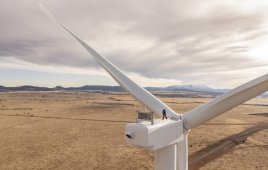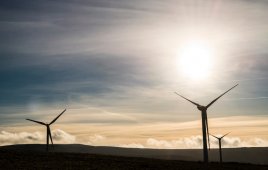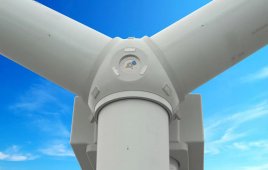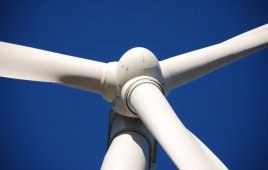Beyond the reach of electric lines and water pipes, people in arid climates struggle every day with the scarcity of potable water. Harsh statistics say 10 people die each minute from water-borne diseases.
These are the places where Eole Water (www.eolewater.com), a French startup, says it hopes to make a difference with its water-generating wind turbine, WMS1000. The prototype, currently testing in Abu Dhabi, uses wind-generated power to transform humidity into filtered water.
The turbine is actually two complementary machines in one. The first, a 30-kW turbine, produces energy like a conventional wind turbine. The second, acting as a giant dehumidifier, pulls air across a condenser to extract its humidity. The machine generates an artificial dew point and what amounts to rainwater that falls into a tank under the nacelle. It then runs through five levels of filtration in the tower.
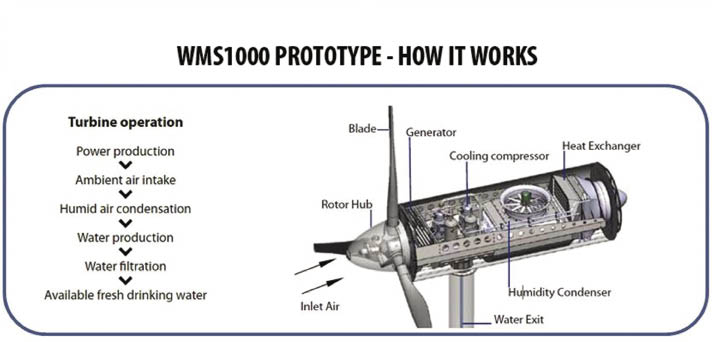
The WMS1000 Prototype turbine produces energy like a conventional wind turbine. Then like a giant dehumidifier, it pulls air across a condenser to extract its humidity.
The WMS1000 has built-in protection for events such as sandstorms and air-borne pollution. The resulting water exceeds quality standards set by the World Health Organization, the company says.
The prototype works well, adds company spokesperson Thibault Janin. Now the company must find ways to interest the “water market” and begin mass production.

The 30-kW turbine produces water that exceeds quality standards set by the World Health Organization. The design has built-in protection for events such as sandstorms and air-borne pollution.
Founder Marc Parent says the idea for the turbine came during a period of residence in the Caribbean where he watched an air conditioner drip water. He soon imagined coupling that process with a wind turbine, creating a self-sufficient water-making machine.
After 11 years of research, Parent had founded Eole Water in 2008 and secured more than $2 million in venture capital to build the prototype. The goal was to produce 1,000 liters of drinking water every day from one turbine. The prototype surpassed expectations. The turbine has an operating lifespan of 20 years.
“In six months of tests, we have collected 50 to 60 liters per hour,” or up to 1,200 liters a day, says Janin. “We have spent over 10 years to reach the level where we are.”
A WMS1000 currently costs $604,000 – “a prototype price.” But before bringing the turbine to dry, isolated areas – especially those in the Middle East and Africa – Eole Water must break into the heavily lobbied water industry. For now, the company says it’s looking to donor countries and organizations, such as the United Nations, that might support installation of the turbines as part of infrastructure development projects.
As the company locates financing, it expects the price of its machine to decrease. “We have already identified expenditure items that can be significantly reduced,” says Janin. WPE
Filed Under: Community wind, Turbines

